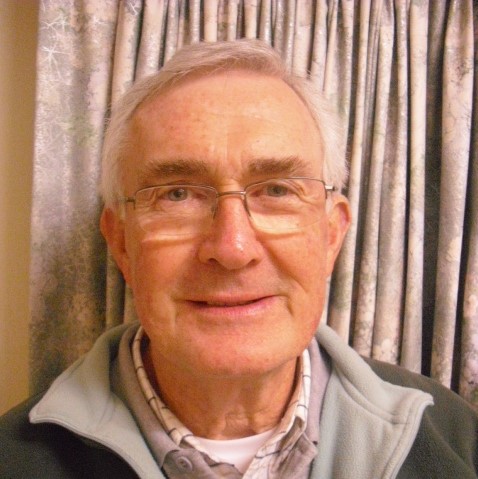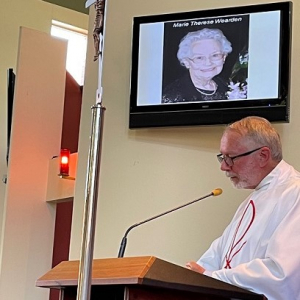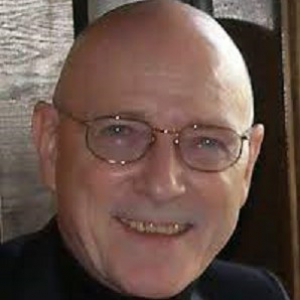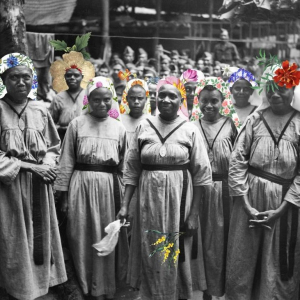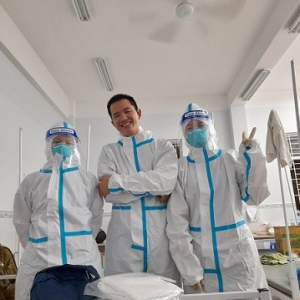Peter MALONE
Congratulations, January 14th, Frank Dineen MSC and Bill Brady MSC. Golden Jubilee of Profession.
Congratulations, January 14th, Frank Dineen MSC and Bill Brady MSC. Golden Jubilee of Profession.
Frank and Bill were ‘late vocations’ of the late 1960s, men who had worked before joining the MSC, and aged over 25. They began their studies and St Paul’s National Seminary, made their novitiate at Sacred Heart Monastery Croydon with Harvey Edmiston MSC, and then returned to St Paul’s to complete their studies and ordination.
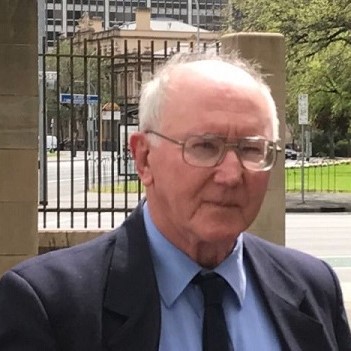
Frank and Bill made their novitiate with Harvey Edmiston. After their profession, they returned to St Paul’s Late Vocations Seminary, Kensington.
Frank spent many years in PNG, has been Novice master, responsible for formation at Cuskelly House, Blackburn, Deputy Provincial. At present he is at Treand House.
Bill has worked in the Northern Territory and in MSC parishes. More recently he has been stationed at Hindmarsh and is at present at Randwick.
In Memoriam, Clare Reilly, Marie Wearden A tribute to Mothers.
In Memoriam, Clare Reilly, Marie Wearden
A tribute to Mothers.
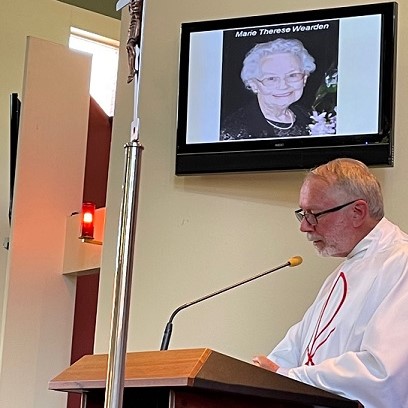
Leo Wearden celebrated his mother’s (Marie) funeral mass on 31st Dec and spoke so eloquently of her and her faith. He chose the readings for the Christmas season which were very uplifting. His brother in Perth who couldn’t be there delivered the eulogy online. He was well supported by the presence of six MSC.

Philip Reilly said his mother’s (Clare) funeral mass, 5th January, was a beautiful farewell for her. Phil and his sister Moya delivered the eulogy followed by several nieces and nephews who also spoke. Some of Phil’s siblings were not able to be there, but it was livestreamed. There were, however, many immediate and extended family who were able to be there in person.

Congratulations, John Walker MSC and Tan Nguyen MSC, Silver Jubilees, Profession
Congratulations, John Walker MSC and Tan Nguyen MSC, Silver Jubilees, Profession
John and Tan made their novitiate with Frank Dinneen. After their profession, they moved to Navarre House, Drummoyne, for theological studies at the Catholic Institute of Sydney.
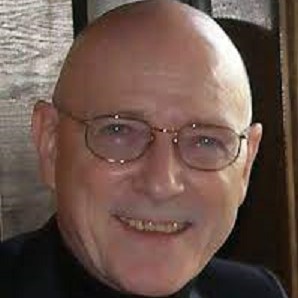
John has done nursing training, especially in Canberra, where he lived for some time. He is stationed at Sacred Heart Monastery, Kensington.
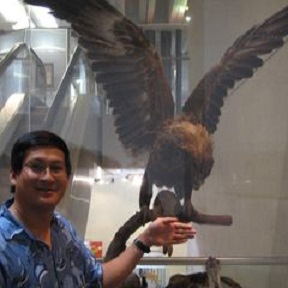
Tan, part of a boat family from Vietnam who settled in Adelaide. He has spent time in ministry on Melville Island, Fiji, in parish supply. He is parish priest of Erskineville.
Daughters of Mary Immaculate, PNG, founded by Archbishop Louis Couppe MSC, a World War II 80th anniversary.
Daughters of Mary Immaculate, PNG, founded by Archbishop Louis Couppe MSC, a World War II 80th anniversary.

When the Japanese invaded Rabaul on New Britain in January 1942, a group of 45 F.M.I. Sisters refused to give up their faith. Instead, they risked their lives to help save hundreds of Australian and European missionaries and civilian detainees who were held captive by the Japanese for three and a half years, first at Vunapope and then in the dense jungle of Ramale.
In 2018, Lisa Hilli, an Australian artist of Gunatuna (Tolai) heritage, discovered their little-known story while researching Australia and Papua New Guinea’s shared war history as part of a creative commission for the Australian War Memorial, supported by the Anzac Centenary Arts and Culture Fund.
It was while she was researching in Rabaul that she first learned of the Daughters of Mary Immaculate, or F.M.I. Sisters, of the Vunapope Catholic Mission. These remarkable Tolai, Bainings and New Guinea Islands women had helped to save the lives of hundreds of men, women and children in New Britain during the Second World War.
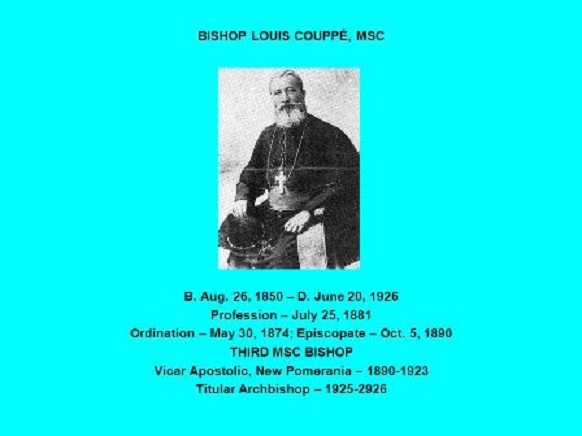
Article Claire Hunter, War Memorial
“It was so hard to find any information about them. This is the problem when it comes to archival records about black or Indigenous people; their records aren’t always there, so I had to dig really deep into the archives to find anything about them.
“It’s an incredible story and it’s really important for me to be able to share Papua New Guinean women’s stories, particularly related to war, because women’s stories aren’t always told, particularly in war or the military, and then you add another level of being black or Papua New Guinean, and it’s like, good luck. So to find this, and to be able to highlight it, and reveal it, was just really special.
“It’s a legacy for my own people, so it’s really significant for me to be able to do that.”
For her artwork, Lisa adorned the Sisters with flowers in reference to the different nationalities of the men, women and children who were held captive at Ramale. There’s the iris to represent the French, the poppy to represent the Belgians, the cornflower to represent the Germans, and a Korean hibiscus to honour the South Korean comfort women that were brought over by the Japanese. The wattle in the middle is a reference to Australia and to the Australian soldiers who liberated the camp at Ramale, while the 45 hand-embroidered cinctures represent each of the individual F.M.I. Sisters.
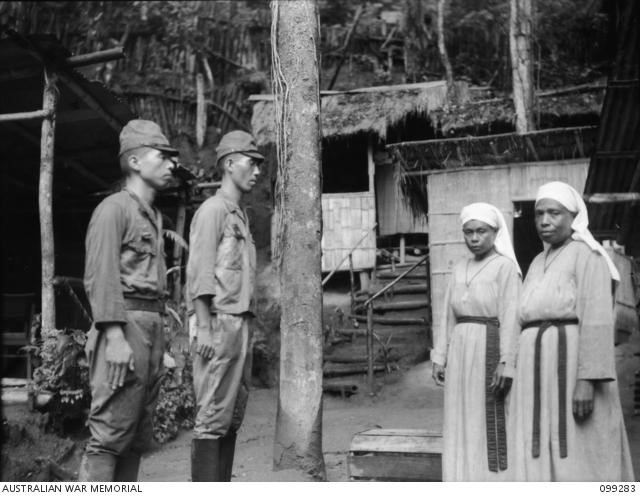
“Only 12 or 13 of these women were photographed, but there were 45 of them, so I wanted to make sure that they were all recognised and honoured,” she said.
“I was really interested in the Sisters’ habit as an item of clothing that signified the practice of their faith. The black cincture they tied around their waist was a very distinct item of the habit that was worn only at the time. They don’t wear it today, and so I kept coming back to it as a really significant piece of clothing from that war history period.”
The four-metre long cinctures were made using a simple black cotton fabric to reflect the Sisters’ modesty, and each is slightly different. The names of 12 Sisters, found on a Memorial in Papua New Guinea, have been lovingly stitched into them, leaving room for more names as they come to light.
“Every time I sat down to stitch into those cinctures, I had to think about the women, and the work and the labour that they did,” Lisa said. “It wasn’t light work what they did, so there was a real heaviness in honouring their names and ensuring that I put weight into stitching every single stitch.”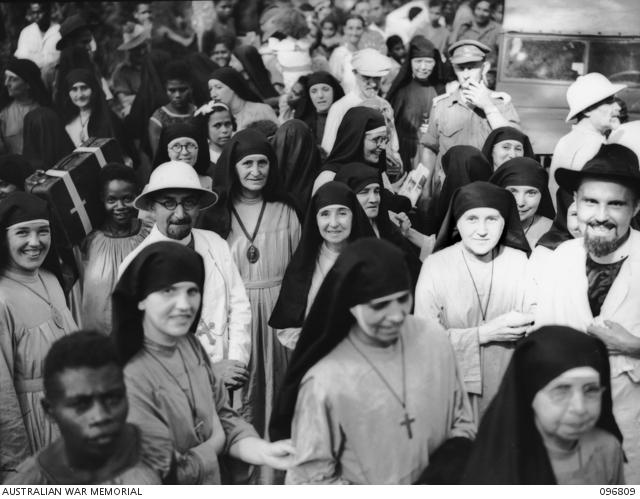
With Bishop Leo Schamrach MSC of Rabaul
New Britain, 5 December 1945. Two F.M.I. Sisters identifying two Japanese soldiers who had tortured them. A small group of the Sisters were tortured by the Japanese and gave evidence during war crimes trials in 1945/6.
She worked with Australian textile artist and friend, Eddy Carroll, to stitch the names into the cinctures, and has since found 30 more names to add to them.
“It was a real labour of love, and it was a really great way to bring back that Australian/Papua New Guinean connection,” she said. “I hope that the artwork is an entry point for people wanting to know and understand more.
“It was a real gift to have to be able to go into such in-depth research and then make something that I was really proud of…
“They really were amazing women.”

Today
Kursk
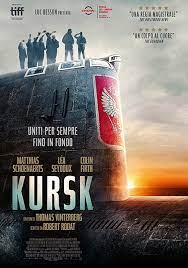
KURSK
France/Belgium, 2018, 117 minutes, Colour.
Matthias Schoenaerts, Lea Seydoux, Peter Simonischek, August Diehl, Max von Sydow, Colin Firth, Magnus Millang.
Directed by Thomas Vinterberg.
Kursk is an international dramatisation of an accident with a Russian submarine, 2000. (Interestingly, there had been a 1997 American film, Hostile Waters, with Martin Sheen and Rutger Hauer as American and Russian submarine Captains and the consequences of an accident at sea).
The cast is also international, a focus on Matthias Schoenaerts embodying the Russian crew, Lea Seydoux as his wife, ultimately leading the wives in protest against the authorities, Max von Sydow as the stubborn and uncomprehending Russian superior, Colin Firth as a British naval expert with Russian contacts, and the possibility of British collaboration to save the Kursk.
Direction is by Thomas Vinterberg, Danish, who began with the Dogme declaration and principles for filmmaking, Festen, but who continued to make films in Denmark as well as internationally, Dear Wendy, Far from the Madding Crowd, and working with Mads Mikkelson, The Hunt and the Oscar-winning Best Foreign Language Film, Another Around.
The film spends some time focusing on the Russians themselves, their camaraderie, the relationship with naval administration, their being exploited, and the details of their behaviour during and after the accident.
Kursk takes its place as one of the many classic films about submarines, Morning Departure, K-19, Crimson Tide, Hunt for Red October…
- Based on actual events? 2000?
- An international collaboration, Danish director, International stars? The Russian background, notices and signs in Russian? English-language? The musical score?
- The ship itself, its condition, carrying the torpedoes, maintenance, errors, the leak? Reporting? The captain’s decision? The explosion? The consequent explosions?
- The tone of the opening, they’ll son, holding breath underwater? Indication of the theme? The presence of the boy, with his mother, the countryside, farewelling his father, the bond with his father? His father and the photos, memories of his son sustaining him? The news of the disaster, at the meetings, his refusal to shake hands with the Russian official? The final gift of his father’s watch?
- The establishing of the characters, the situation of the wedding, the camaraderie? The harsh realities of non-payment? Protests? Official responses? Pawning watches, paying for the champagne? The ceremony, the speeches, the good spirit? In view of the impending disaster?
- Tony, relationship with her husband, love for her son, pregnant? Domestic scenes, the wedding? The farewell? Her concern, getting the news, with the other wives, going to the meetings, asking questions, harsh reactions? Standing up to the authorities? The final grief? Funeral? Walking with her son on the cliffs? The portrait of the other wives, the wife went past experiences, finally her outburst, the injection and her being sedated and carried out?
- On board, camaraderie, the sense of duty, expertise? The explosion, the consequences, the number of deaths? Fire, floating? Mikhail and his authority, expertise, command of the men? The decisions, consolidation, exploration? The young man and his fears and Mikhail reassuring him? The explosive – the later explosion? Surviving, the man becoming upset, trying to open the hatch, Mikhail overcoming him? Oleg and his telling the story of the polar bear, morale? Hearing the rescue, the hatch not connecting? Mikhail and his companion, the water, the cold? The men dying?
- The authorities, competent and incompetent? The new hatch, its inadequacies, the two failures? The admiral, his concern, being relieved from his duties? Coming in at the authorities, press conferences, the criticisms by the wives? Seen on television?
- Russian secrecy, selling off submarines, no maintenance? Unwilling to have international help? Official statements at conferences? Cover-ups?
- The Russian admiral, his friendship with David Russell, his being prevented for communicating? Eventual contact? His concern, grief?
- The British, David Russell, efficient, knowledge of what was happening, offering to help, the Americans and the French? Being put on hold? Going to the accident scene, the plea to the authorities, putting off the decision? Whether the British could have saved the men or not?
- The aftermath, the authorities, dealing with the wives and families?
- The film’s criticism of authorities, lack of maintenance, inefficiencies, cover-ups?
Good Advice
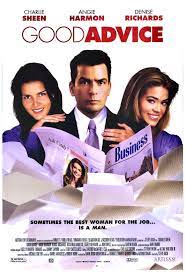
GOOD ADVICE
US, 2001, 93 minutes, Colour.
Charlie Sheen, Angie Harmon, Denise Richards, Jon Lovitz, Rosanna Arquette, Estelle Harris, Barry Newman.
Directed by Steve Rash.
Good Advice is a romantic comedy of the take-it-or-leave-it variety. Perhaps the emphasis is on the take-it!
The title refers to one of those agony aunt columns in newspapers offering advice to those who write in. The writer in this case is Cindy, Denise Richards, not very good at her work. She is in a relationship with an investment expert, Ryan, Charlie Sheen, who overreaches himself with insider trading on advice he received on the golf course (only to find that it was revenge by a husband because of his sleeping with his wife). And then Cindy goes off to Brazil!
What is a bankrupt investor to do? Actually, pretend to be Cindy, go to the editor, pretend, bring in Cindy’s advice, develop a relationship with the letters editor, Page (Angie Harmon), and then develop a talent for the advice. The boss of a rival newspaper also wants to buy out the column – and, when Cindy returns, she demands the column back, so Ryan and Page set her up with the owner who does a big financial deal only to discover how inept she is.
An irony about the film. This is where Charlie Sheen met Denise Richards and they married – but, not for long.
- The title? Ironies? Straightforward for Cindy’s column? The ironies about Roy, his financial ambitions, advice to clients? Failures?
- Amoral/amoral atmosphere, in Wall Street and business dealings, in newspaper proprietors and competition, in relationships? A setting for comedy?
- The New York setting, Wall Street, business offices? Editorial rooms? Apartments? The musical score?
- The tone of the introduction, Ryan, his relationship with Simpson’s wife, deception, cavalier, playing golf, listening to the financial advice, going to the office during the night, finding the clients, the deal and promises? The reality, Simpson and his deceit, the confrontation with Ryan, revenge? Ryan and his clients, fired from his job, official investigation about insider trading? His relationship with Cindy, her flight units, leaving him?
- Cindy, writing her column, no empathy, the contract, the clash with Page? Walking out? Going to Brazil? Relationships, the wealthy life? On the plane, the paparazzi, Don Simpson contacting her, the proposition, her agreement? The clash with Ryan, the clash with Page? The press conference, revealing the truth, the revenge on Simpson, and the financial loss?
- Page, her money, her work, the paper, Cindy’s column, her criticisms? Iris and her work as assistant, age, flirty, red hair, the discussion with Ryan, guessing the truth, helping him with Page? Her advice to page, clothes, outings?
- Ryan, his idea, writing the column, the insensitive initial responses? His friendship with Barry and Cathy? Testing ideas with Barry? Possible answers, speculating of how to respond to women, the change of heart, the range of letters? The dealings with Page, deception about Cindy being ill, the contract? The continued letters, the growing popularity, people reading, from two letters to bag falls? The media being interested, Lucy capstone and her visit, Ryan putting her off? The other speculations?
- Ryan, the visits to page, accompanying her to the performance artist (and the satire on this kind of art)? The blue paint on his face, the kiss, Page and her reaction? Ryan trying to break down the resistance? Declaration of love, the night together, Cindy’s arrival?
- Ryan, manipulating the financial world, buying Simpson stock, selling it? Simpson ruined? Revenge?
- The background of Barry and Cathy, the relationship, plastic surgery, her concern about her figure, younger, friendship with Cindy? Barry taking the money, Cathy upset, the huge profits?
- The American kind of story, starting in an amoral atmosphere, conversion experience, change of heart?
Thank You for Your Service
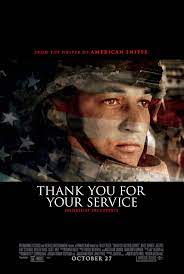
THANK YOU FOR YOUR SERVICE
US, 2017, 109 minutes, Colour.
Miles Teller, Beulah Koale, Joe Cole, Scott Haze, Haley Bennett, Amy Schumer, Omar J.Dorsey, Keisha Castle-Hughes, David Morse, Mark Weber.
Directed by Jason Hall.
This is a grim war film, scenes of action in Iraq, some of them quite devastating on a personal level for those concerned, injured or dead. This is a grim war film in terms of the aftermath, post traumatic stress disorder. The first film written and directed by Jason Hall, it is based on a non-fiction book about war action and the aftermath.
The film focuses on Adam, played by a Miles Teller, decorated, seen as heroic, but plagued his by memories and nightmares of his feeling responsible for injuries and deaths of fellow soldiers, friends. He is supported by his wife, Haley Bennett, and two children.
However, he is concerned, especially with two of those returning from Iraq, one, played by Joe Cole, who finds that his fiancee has taken his money and children – and kills himself in front of her. The other is an American Samoan soldier, Beulah Koale, friendly, decent, but failing to settle in, caught up with drug dealers.
There is also the wife of one of the men who took his place on a mission, took a wrong turn, hit a mine, and while others were saved, he was inadvertently left behind and died in the fire. The wife is played by Amy Schumer in an unexpectedly serious performance.
The film was well received but was not successful at the box office, one of those films that many Americans with associations from Iraq and Afghanistan, injuries and deaths, post-traumatic stress disorder, Warren willing to watch.
- The title? The American government and public towards those who served in the military? The irony concerning their treatment after the war, PTSD?
- The war sequences, the opening, the roof, the shops, Adam carrying Emery down the steps, falling? The consequences? The final, and explaining the situation to Amanda, the mission, Doster telling him to rest, the attack, pulling the victims from the vehicle? The impact of watching the war sequences? And their consequences on the men?
- The return home, Adam, Tausolo, Billy Waller? Jokes on the plane? The welcome home, family, Amanda asking Adam for explanations, the bands in the cheers?
- Billy Waller’s story, his fiancee, the empty house, the phone calls, desperate, staying the night with Adam, the gun, going to the bank, confronting his fiancee, her reactions, his shooting himself? The funeral, everybody gathered, the grief?
- Adam’s story, Saskia and the children, wanting to go back to their house? Adam, seemingly okay, private thoughts, suicidal? Supporting Billy Waller? Supporting dorsal? Their discussions, going hunting, the night classes, Adam seeing things? Ordinary lives, the possibility of jobs? The going to the headquarters, waiting for their turn, the interviews, the number of veterans lining up? Amanda giving him the California address? The tensions with Saskia, not communicating with her? Going to the veterans’ office, filling out the forms, the interrogations, admitting difficulties? Saskia reading the document? His love for his children, dropping Jackson? Upset, going to visit Emory, their discussions, memories, Emory’s gratitude for Adam saving his life? The phone from Tausolo, under the bridge, the shooting, rescuing him? Putting him on the bus for California? Self-sacrifice?
- Tausolo’s story, action, grateful to the military, his girlfriend, the return home, her pregnancy? His lack of memory, disturbed? Discussions with Adam? Hunting? The drugs? Wanting drugs, the contacts? The deal is wanting him to drive the car? The news of the birth, going to the hospital, the impact of the baby? The dangers, the drug dealers on the set up, shooting? Help from Adam, Adam putting him on the bus to California?
- Mike Emory, the episode in Iraq, his injuries, his brain? Crippled? The fall, life saved, going to Arkansas, living in retirement, disabled, the effect of the visit from Adam?
- The picture of the military officials, the former officer urging Adam not to give bad example to the younger men? The attitudes of those behind the desks, not understanding post-traumatic stress? The sympathetic women?
- The film reflecting on Americans in Iraq in the 2000s, the impact?
Sgt. Stubby: An American Hero
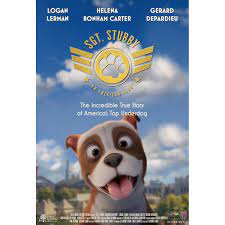
SGT.STUBBY: AN AMERICAN HERO
Ireland/US/UK, 2018, 84 minutes, Colour.
Voices of: Logan Lerman, Helena Bonham Carter, Gerard Depardieu, Jordan Beck, Jim Pharr.
Directed by Richard Lanni.
This is based on a true story, Stubby being the most on a dog in action in World War I. In fact, he died in 1926, had an obituary in the newspapers, and was awarded, posthumously, the Purple Heart (which was instituted in 1932).
This is a brightly animated film, engagingly drawn, the human characters, principally American soldiers and officers with some women from a French village. Stubby is more realistic, marks rather than speaking, works his tail but is trying to do a salute!
The film has won quite a number of awards. It also has a very strong international voice cast led by American Logan Lerman, French Gerard Depardieu, British Helena Bonham Carter.
This is a film which brings World War I to life, its realities, but in such a way that a younger audience can watch it, not underestimating the harshness but understanding it, especially by their identification with Stubby and his war heroism.
There are sequences of the training of the American soldiers in 1917, quite some detail, with life in the camp, tents, huts, and mess hall in the cook. The war sequences are also done in quite some detail, especially the visualising of the trenches, hardships, no man’s land, the bombardments, the injured soldiers with Stubby identifying them so that they could be dug out when they were covered with mud. There is also a rather vivid sequence with a teargas cloud over a village.
There are some sparring between the French and the Americans but with the character of the large Gaston, a former chef, with a wife and three daughters, befriending Robert, Stubby’s master, calling themselves the Three Musketeers, there is a good feeling of friendship.
Younger audiences will find it interesting, will identify with Stubby. And, for adult audiences, it is a chance to have a different perspective on World War I.
- Based on a true story? US and World War I? Stubby and his story?
- A film written and designed for younger audiences, for children to appreciate something of World War I, but also a dog story? A film for adults?
- The animation, the depiction of human characters, of Stubby, of the US, the soldiers marching, the details of training, life at camp, on the boat, in the war, the trenches, the teargas, the French village, hospitals, the war zones? The musical score? Over Their and Back on the farm…?
- Stubby as a character, as drawn, realistic, cute and not cute, the value of his not speaking, but the human touches, wagging his tail, and especially the salute?
- Stubby, wanting to eat, the crowds watching the soldiers, Robert Conroy throwing him the biscuit, his following, into the camp, the bond with Robert? With Olsen and Schroeder? The cooks bad reaction – but later liking Stubby and to care for him during the war? The worry about the senior officers, stubby and his presence, salute, everybody liking him? Even when he got onto the boat?
- The story as told by Margaret, her perspective on Robert, on Stubby, the letters, the cards, her anxiety during the war? A very masculine film but using the female storytelling?
- The details of the training, arduous, Stubby participating? The end of the course, the congratulations of the officers? Appointed to France, Robert giving Stubby to the cook, Stubby getting free, following the soldiers, onto the boat?
- The trenches, the visuals of the trenches, the French soldiers in blue, the Americans, tensions between them, discussions about food, the Americans not drinking wine? Stubby, in the trench, chasing the rat? Clearing the vermin from the trenches? The issue of the gas mask, for the soldiers, the people in the village, for Stubby, his awareness of the teargas, hurrying to the village, urging people inside, the visuals of the cloud of gas, passing, people coming out, congratulations to Stubby?
- Stubby and his role of alerting authorities to soldiers covered in sand in the trenches, saving their lives?
- Olsen, red hair, cheeky, playing cards with the French? Schroeder, originally German, American? His concerns, wanting to fight? His being injured and taken to hospital? Stubby, in the no man’s land, his being injured, hospital?
- Stubby, out in no man’s land, racing to the rescue, the Americans putting up the smoke, the rescue?
- Gaston, the burly Frenchman, the cook, his photos, wife and daughters, working with Robert, writing the horses, Stubby accompanying, the lookout, binoculars, seeing the Germans? The firing of the teargas?
- The bond between Gaston and, Robert and stubby, the Three Musketeers? Gaston having to go back to work for the French?
- The flu, the epidemic, Robert in hospital, Margaret’s concern? Stubby finding him, his getting better?
- Margaret and the description of the war, the maps of France, the towns, the sieges? 1917-1918? The final months? The talk of peace?
- November 1918, the cells in the trench, the American authorities, one more advance before the signing of the armistice? The death of Olsen? Gas Tom’s arrival? In the trenches? Peace?
- Stubby, getting the Iron Cross from the German prisoner, the awards?
- The return home, America’s contribution to the war in Europe?
- The fact that Stubby died in 1926, posthumous Purple Heart (instituted in 1932)?
2021: The Year That Was (and often wasn’t).
2021: The Year That Was (and often wasn’t).
Annual Report from the Australian Province for the MSC General Administration, Analecta.
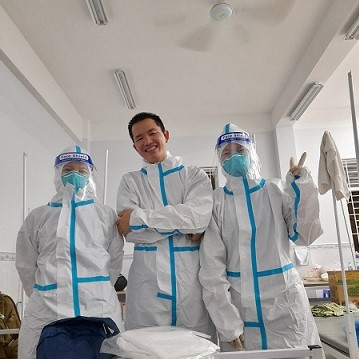
Coronavirus
The key word for both 2020 and 2021 has been Coronavirus. And, this in its Covid-19 variants, especially Delta and its severity and spread in 2021, with Omicron emerging in the last months of the year. For most of the two years, Australia has been blessed with fewer infections although these started to increase in the middle of 2021, reaching high daily statistics towards the end of the year, especially New South Wales and Victoria. The only report of a member of the Australian province, apart from in Vietnam, having Covid was Tony Young in Eastern Papua. (Too soon – by the end of the first week of 2022, three confreres are reported with the infection,)
2020s saw substantial lockdowns, especially in Melbourne, limiting a great deal of active ministry. While the earlier part of 2021 saw some greater movement, by midyear and onwards there was more substantial lockdown. In the latter part of the year, there were changes of policy, some restrictions lifted, some interstate travel more open.
On the provincial level, the provincial was unable to travel much around Australia and not, as customary, visiting Vietnam for ordinations and profession. Zoom was used for Provincial Council meetings as well as the General Conference sessions. However, with a lull in restrictions, the annual Provincial Conference took place live in May.

Vietnam also had increasing cases during 2021 and some lockdowns, some members were infected. But, the government appeal for voluntary workers to deal with the pandemic, meant that a number of students worked in the hospitals. However, by the end of the year, there was a slight freeing of travel between Australia and Vietnam, which allowed Dahn, who had been in Australia for two years, a year on Bathurst island and the year at the Heart of Life Centre and the Siloam Program, to return. Long, our student from Hanoi, was able to come to Sydney to begin English-language studies at the Yarra theological Union (where he had been studying during 2021 by Zoom). Two more, Deacon Chung and student Hoa, are expected from Vietnam in 2022.
The life of the Vietnam section of the province can be found in much more detail in the Vietnam Report.
Formation
At the end of 2020, Daniel Magadia MSC and Trieu Nguyen MSC, made their first vows at Douglas Park and began their studies at YTU, living in Cuskelly House, Blackburn, Daniel doing theological studies, Trieu studying English (as he had in 2019), graduating in midyear and then moving to theological studies. Mark Hanns was formation director.
Vincent Phan and Anh Tuan Nguyen, who had a pre-novitiate year in Blackburn in 2020, much of it in lockdown, began their novitiate. However, it was decided that Anh should continue with his English studies and he returned to Melbourne, continuing as a novice. Vincent made his profession in December, Peter Harvey-Jackson as the director. (Vincent is to return to Melbourne for 2022 and Anh will begin his canonical novitiate again in Melbourne, Khoi Nguyen his Novice Director.)

During the year there has been vocation promotion, with Frank Dineen and with Thang Nguyen (with an outreach to the Vietnamese in Australia), an organisation of retreats and meetings in Melbourne, in person and by zoom, as well as Trieu and Daniel working on the Australian Vocations Facebook Page.
Deaths
There were deaths in the province during 2021:
Reyer Flapper, Dutch born, lay missionary, late vocation, more lately at Douglas Park. 22nd February.
Harold Baker, education, Principal of Downlands, latter decades at Daramalan. 14th March.

William Cunningham, veteran missionary in Eastern Papua, historian of the mission, more lately at St Joseph’s home. 18th June.
Bernard McGrane, veteran missionary in Eastern Papua, more lately at St Joseph’s home. 22nd July.
Walter Black, philosopher, ethicist, moral theologian, more lately in Perth. 20th August.
Aged Care
As the members of the province age, the province has appointed Catherine Molihan, with studies in Health Leadership and management, to supervise care for the aged, especially at Kensington monastery, and for those in care at St Joseph’s. Her main focus is to provide every person with compassionate care and the necessary supports to maintain their independence and wellbeing within the comforts of their own home.
Another feature of the life of the province is the diminishing number of Australian, confreres working in PNG, Japan, the Northern Territory.
Safeguarding

A great deal of time and energy goes into safeguarding issues, compassionate, legal, financial. Meta Jackman is the director, Professional Standards and Safeguarding (and is also a member of the International team coordinated by Tim Brennan from the General House). Documentation is continually updated. Historical cases on Melville Island led to apologies and statements from the MSC, the OLSH sisters, the diocese of Darwin.
In July, this policy was issued:
The Australian Catholic Safeguarding Limited (ACSL) which absorbed the Catholic Professional Standards Limited (CPSL) was formed as a result of the Royal Commission to, amongst other duties, develop National Catholic Safeguarding Standards.
A publicly visible Commitment Statement is one of several criteria that is important in developing and promoting a culture of safety.
The MSC Commitment Statement was and all future MSC Safeguarding Policies and Procedures will be developed by the following process.
A draft document is prepared by Meta Jackman (Director of Professional Standards and Safeguarding), Chris McPhee MSC (Provincial) and Peter Hendriks MSC (Deputy Provincial). This document is developed from a number of sources, including CRA templates, the ACSL Safeguarding Standards and documents from other institutions.
The document goes to an MSC Working group, then to the MSC Professional Standards Advisory Board (members not MSC), then to the Provincial Council.
Education
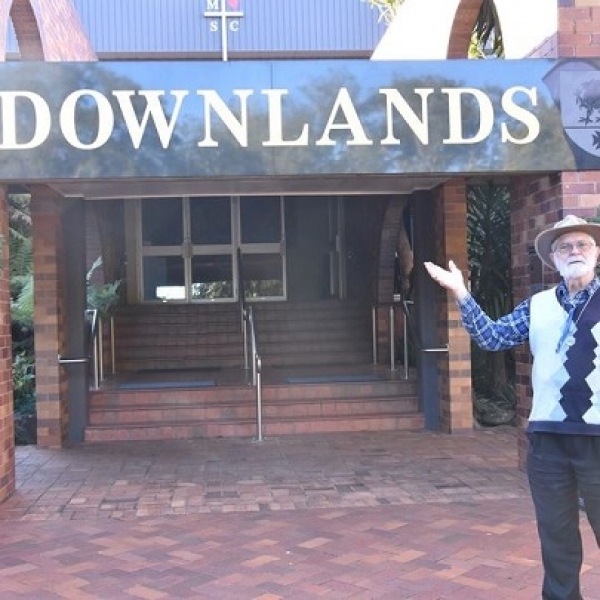
During 2021, MSC colleges experienced quite a deal of lockdown. Downlands College, where there were fewer restrictions, celebrated 90 years. Chevalier College, experiencing considerable lockdown in New South Wales, celebrated its 75 years. Monivae College and Daramalan also experienced long lockdown periods. Rachel Davies was appointed the incoming Principal at Daramalan. Former Principal, Rita Daniels, has been appointed member of the MSC Education Members’ Council.
Also a sign of the times is the diminishing MSC presence in our colleges: Vince Carroll at Downlands, Gerry Burke, John Franzmann, John Mulrooney at Chevalier, Ted McCormack in residence for parish supply at Monivae. Bob Irwin, confined by lockdown for some time, contributed to Monivae ministry for several months. Kimi Vunivesilevu, parish priest of Kippax, with Michael Stephen, assistant, exercise chaplaincy outreach at Daramalan.
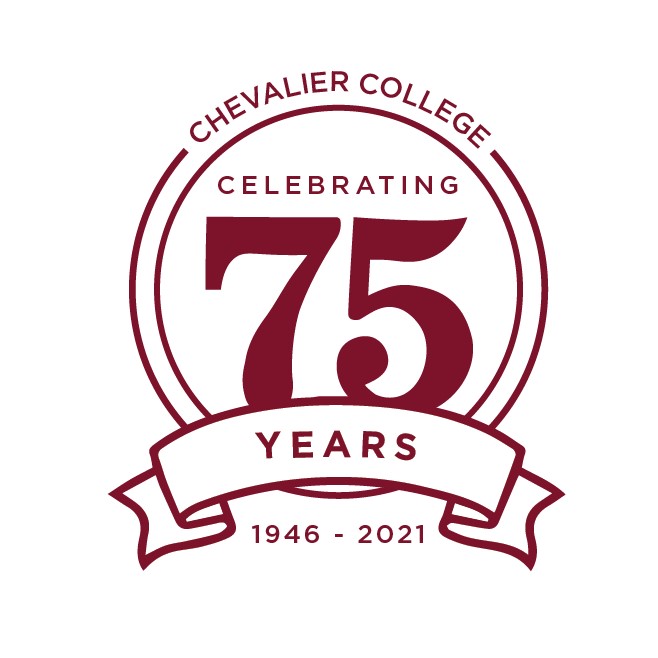
Parishes
The parishes continued their ministry, providing masses and liturgy online during the lockdowns and beyond. Qui Duc Tran, who had been appointed to teach at the Pacific Regional Seminary in Suva but was prevented entering Fiji because of Covid, resided at Our Lady of the Rosary, Kensington and delivered classes by Zoom. Pat Mara also stayed there during his course in Sydney in Aboriginal Studies. In Adelaide, with the closure of MSC ministry in Hindmarsh, Paul Cashen is superior of MSC in Adelaide, and Peter Hearn arrived to take up his role as parish priest. Kenji Konda, was appointed to Henley Beach for parish ministry as well as continuing theological studies. John Kelliher moved from being superior at Kensington monastery to parish priest in Nightcliff, Darwin.
Spirituality Ministry
For the Chevalier Institute and for the Retreat House at Douglas Park, lockdowns meant restricted ministries, with some courses and retreats conducted online. At the Heart of Life Centre, in its new accommodation at the Brigidine Centre, Kildara, in Malvern, there was a mixture of face-to-face sessions and Zoom, Zoom prevailing in the last three months of the year although, happily, restrictions were lifted for a face-to-face graduation ceremony. Numbers were strong at Heart of Life, for the full-time and part-time Siloam Program, and for the part-time program, Spiritual , Leaders. For Siloam, Dahn Doan and Tru Nguyen participated full-time with Khoi Nguyen in the part-time program. Mark Hanns participated in Spiritual Leaders. The MSC member of the staff was Peter Malone, responsible for the Religious Experience course.
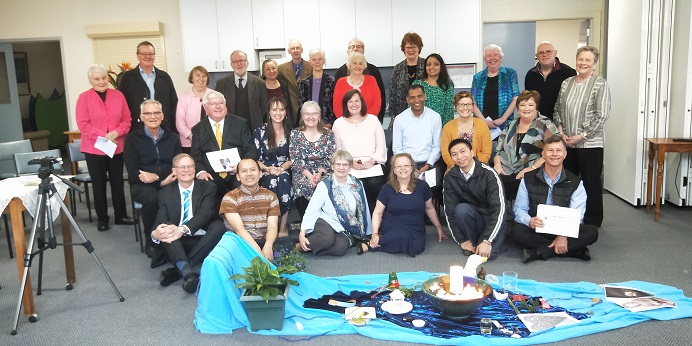
Heart of Life also farewelled Paul Beirne after eight years as director, a strong achievement in being able to move Heart of Life from its former home at the Franciscans, Box Hill, through a year courtesy of the Anglican Church in Malvern, and then to Kildara (with a contract for five years). Clare Shearman who, with her husband Artie, manage the retreat centre at Shoreham, is the new director of Heart of Life, MSC Spirituality and Pastoral Formation 2022.
With two MSC students at YTU, the MSC presence is diminishing with the retirement of Philip Malone after 22 years teaching Moral Theology and liturgical courses.
Lockdown did not diminish the publishing and media Ministry of the province which is the subject of a further report.
Boy Called Christmas. A
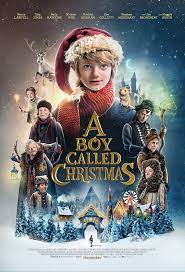
A BOY CALLED CHRISTMAS
UK, 2021, 106 minutes, Colour.
Maggie Smith, Henry Lawfull, Michiel Huismann, Jim Broadbent, Sally Perkins, Joel Fry, Kristin Wiig, Toby Jones, voice of: Stephen Merchant.
Directed by Gil Kenan.
This is a British Christmas entertainment, for the younger audiences, but with something of a classic British cast, parents and grandparents may well enjoy watching it with the children.
Here we have a different take on some Christmas origins. The perspective is that of elves, reindeers, presents and centre, rather than the Bethlehem-origins story (no mention of this). And, even St Nicholas might not be pleased with this film as it offers quite an alternative to his story, the Bishop who kindly provided gifts and allowed his name to be transferred from St Nicholas to Santa Claus!
So, this is an alert to those who might want to see something of an acknowledgement of what Christmas really is rather than just the story of elves and gifts.
A film with Maggie Smith in its opening sequence certainly commands attention. No refugee from Downton Abbey here. Off she trudges in snowclad London streets, Aunt Ruth, to babysit three children and tell them stories. They are a bit grumpy, something of a captive audience – but we are willing to listen to her. And, of course, they will too!
She tells a story of Lapland, a remote town, a father who works with his son, Nick, (Harry Lawfull). There are some cantankerous types in the town but the King comes out (Jim Broadbent) to urge everyone to hope. When his father goes north and is not heard of, Nick decides to go to search for him.
So, he sets out to find his father, accompanied by a reindeer, Blitzen, and his pet mouse, Miika whom he trains to talk (with the voice of Stephen Merchant!). He does discover Elfland, many friendly, but controlled by an almost-witch -like character, Mother Vodol, played intensely by Sally Perkins. There are some friendly elves, especially Toby Jones, and some of the children. As Nick goes on his quest to find his father, he discovers some sinister doings, especially the kidnapping of a little elf, confined to a cage.
All kinds of adventures, Nick’s father and his love for his son, rescuing the kidnapped elf, the return to Elfland, Nick put on trial, but his bringing back the little elf and a wonderful transformation. The elves are back to work making plenty of toys, Nick taking a bag full, returning to the King, ho-ho, joins with Nick and Blitzen to do the Christmas tour and a happy distributing of gifts. And there is a curious comic cameo by Kristin Wiig as the grumpy Aunt Carlotta who is a partial for chocolates, especially those we see made in Elf land.
So here we are, a Lapland alternative to North pole stories (though they are much the same), an opportunity to listen to Maggie Smith telling the story (and noticing her ears as she puts on her hat and goes on her way)!
- A Christmas story? A variation on the St Nicholas, Santa Claus story?
- The opening in London, the children, their father and his work, Aunt Ruth arriving, their dislike of her, but her telling the story, getting them interested, the development of the story? Maggie Smith as Aunt Ruth?
- The forests, Lapland, the town, Nicholas and his father, Joel, the death of his mother? Unhappiness? The king and his speech, urging his subjects to find some hope? Inspiring Nicholas, his dreams of elfland and the later revelation about his mother? Joel going off to search for elfland, the band of hunters? Nicholas left in the care of the greedy Aunt Carlotta?
- Nicholas, the mouse, teaching it to speak? His decision to go on the expedition to find his father? Their encounter with the deer, Blitzen?
- Coming to Elfland, nobody there, Nicholas being taken, Father Topo, the harshness? Nicholas rescued by the little girl? Continuing on his mission, finding the hunters, finding his father one of the hunters, disappointment? His father’s change of heart, taking off with Blitzen, the weight, the father sacrificing himself? Rescuing the boy from elfland?
- The return to Elfland, the trial, Father Topo, Nicholas taken, the return of the boy? The change of heart in Elfland?
- The tradition of making toys, all the elves going into production, the preparations, the decision to deliver the toys, Nicholas and Blitzen?
- His return home, Aunt Carlotta pacified by the chocolates, going to see the King, the king wary, delighted with the news, the toys, wearing the red suit, going with Blitzen, travelling to all the houses, the chimneys or getting in the door, delivering the presents?
- An enjoyable Christmas story for younger audiences, older audiences delighting in Maggie Smith – and the finale with the glimpse of her elves’ ears?

